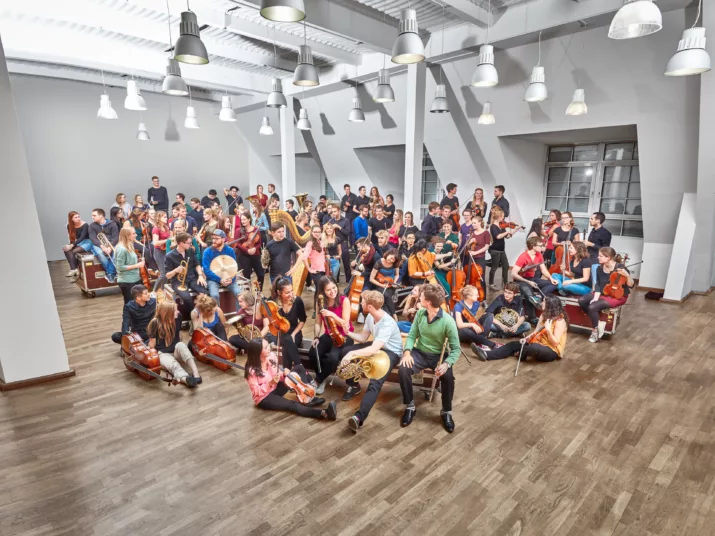
The Junge Deutsche Philharmonie. Six musicians of the orchestra will interpret Beethoven's 6th symphony on 5 June. Photo: Achim Reissner
Beethoven Pastoral Project will turn the Futurium exhibition into a venue of sound – video of the concert available online
A Symphony for the Climate
The Pastoral Project is one of the highlights of the Beethoven Jubilee Year. For the United Nations’ World Environment Day on 5 June 2020, artists from all over the world had been invited to engage themselves creatively with Beethoven’s Symphony No. 6 and to publish videos of the results on the Pastoral Project Platform. On the initiative of Germany’s Federal Minister of State for Culture, Professor Monika Grütters, the Futurium exhibition became one of the venues of sound for the Pastoral Project.

The Junge Deutsche Philharmonie. Six musicians of the orchestra will interpret Beethoven's 6th symphony on 5 June. Photo: Achim Reissner
Ludwig van Beethoven was known to love nature. Against this background, the Bonn-based Beethoven Jubiläums GmbH (Beethoven Anniversary Society) and the UN Climate Change Secretariat have jointly initiated the Beethoven Pastoral Project, which is to take place on World Environment Day. Beethoven’s Symphony No. 6, also known as the Pastoral Symphony, is testament to the composer’s love of nature.
Federal Minister of State for Culture Professor Monika Grütters says: “Beethoven's work not only pays homage to nature’s beauty, but also brings us to reflect on the relationship between humans and the environment. For this reason, it was very important to me to get involved in organising a performance for the Pastoral Project. After all, culture is at the forefront when it comes to shaping a sustainable future. Especially in the cultural sphere, there are many pioneers in the field of environmental protection. Running things in a sustainable way or producing things with a sense of environmental consciousness are possible without restricting the wealth of artistic expression. The cultural sector shows us in lots of different ways how it is taking on its own share of responsibility for the preservation of the very basis of our lives – and it does so too in order to live up to its function as a role model for society.”
In the Futurium exhibition, musicians belonging to Germany’s federal student orchestra Junge Deutsche Philharmonie contributed to the Beethoven Pastoral Project by bringing the master’s 6th Symphony to life in a version for string sextetto. The musicians blended themselves into the scenery of the “neo-natural” sculpture. This gigantic wooden sculpture looks like a living and growing natural structure, because its appearance is patterned on the composition of tiny organisms. The sculpture thus embodies the desire to let ourselves be more strongly inspired by nature when designing our living environment.
Perfect setting: the neonature-sculpture at Futurium. Photo: Jan Windszus
Futurium Director Stefan Brandt was delighted with the unusual performance in the exhibition’s thinking space Nature: “The main point of this part of the exhibition is to promote a more responsible use of natural resources – and this is a direct link to the issue that lies at the heart of the UN’s World Environment Day. In addition to scientific approaches, we’re also interested in artistic perspectives when engaging with the great challenges of the future, because we’re convinced of the power of going at things in an interdisciplinary way. In this sense, the Pastoral Project is a beautiful example of how information and imagination can be brought together.”
The musical performance from Futurium will be available for viewers here: